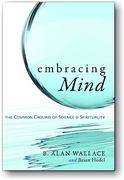"These lectures by B. Alan Wallace were recorded in MP3 format at the Unity Church in Santa Barbara."
Jesus counseled his followers to be perfect as their Father in heaven is perfect, and for centuries, mystical union with God—understood as perfect love and omniscient wisdom—was the ideal of Christian contemplatives. Buddha counseled his followers to realize perfect freedom from suffering by irreversibly dispelling all the afflictions and obscurations of the mind. The ideals of personal liberation and perfect enlightenment have been pursued by Buddhist contemplatives over the past 2,500 years.
While these two contemplative traditions appear to have had little contact throughout their long histories, they did exhibit remarkable parallels as well as differences. Ideals of perfection and the means to realize it will be explored in this lecture, with the hope that the vitality of both the Christian and Buddhist contemplative traditions may be revitalized in the modern era, which could so deeply benefit from their insights and wisdom.
Paths to Perfection - 1
Paths to Perfection - 2
Paths to Perfection - 3
Paths to Perfection - 4
Paths to Perfection - 5
Paths to Perfection - 6
Paths to Perfection 7 - Q & A
Paths Slides - Information
THE CONSCIOUS UNIVERSE
The Conscious Universe: Where Buddhism and Physics Converge
Recorded at Unity Church, Santa Barbara, CA , Jan. 16, 2008
- Free Download -
Physicists have long assumed that the universe is fundamentally composed of matter and energy and that life and consciousness are accidental byproducts of configurations of matter. But a growing number of distinguished physicists are now suggesting that consciousness may play a much more fundamental role in nature than scientists previously believed.
In this lecture Alan Wallace will review some of the most provocative theories presented by such leading physicists as John Wheeler, Stephen Hawking, and Andre Linde that challenge many of the materialist assumptions based on outdated 19th-century physics. And he will discuss how these theories may relate to Buddhist theories and practices, including those of the Theravada, Mahayana, and Dzogchen traditions.
Conscious Universe 1
Conscious Universe 2
Conscious Universe 3
Conscious Universe 4
Conscious Universe 5
Conscious Universe 6
B. Alan Wallace, Ph.D - is the Santa Barbara Institute’s founder and president, combines an extensive background in contemplative practice with equally rigorous academic and scientific training. From 1971 to 1984, he immersed himself in Tibetan Buddhist studies, first in Dharamsala, India, and then in Switzerland under the tutelage of the eminent scholar Geshe Rabten. He then received a B.A. in physics and the philosophy of science at Amherst College, followed by a Ph.D. in religious studies at Stanford University. From 1997 to 2001, Dr. Wallace taught in the Department of Religious Studies at the University of California, Santa Barbara, where his classes focused on Tibetan Buddhist studies and the interface between science and religion.

Embracing Mind - B. Alan Wallace
Read First Chapter - 24 pages / Free Download - PDF
Amazon.com - Book Description / Both science and spirituality search for “ultimate truths.” God, the Big Bang, nirvana, the theory of evolution, relativity, quantum mechanics—these are some of the concepts that have been articulated as a result of that search. But the human capacity for exploring these ultimate sources of truth—the one thing that unites science and spirituality—is often overlooked.
Embracing Mind argues (1) that science has hobbled itself by ignoring its unique source of inspiration—the mind—and (2) that the schism between science and spirituality is unnecessary. In language accessible to any intelligent reader, Embracing Mind first explores the veracity of major scientific “myths,” then presents a viable science of the mind emanating from contemplative spirituality, including Hindu, Christian, Sufi, and Buddhist views.
The Santa Barbara Institute - is dedicated to interdisciplinary research and education to advance understanding of the nature and potentials of consciousness. Its comprehensive approach integrates the insights and techniques of contemporary science with those of the world’s classic contemplative and philosophical traditions.
Special Thanks to © The Santa Barbara Institute